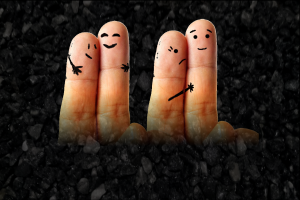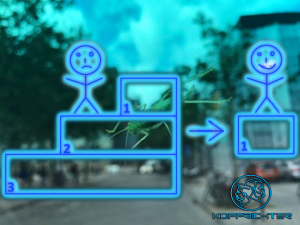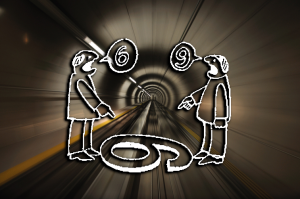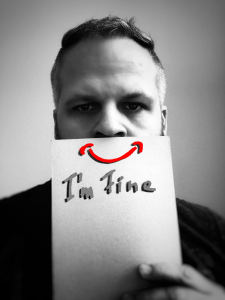Relationship or partnership

Living on equal terms
Relationships, as a rule, are thus named, because we team up with others in mutual dependency, we relate to our counterparts. At the end of the day, it is not even important who is the stronger counterpart or who is more or less dependent of whom. As long as you are dependent, you can’t be authentic, that is, hardly or not at all.
As soon as you fear losing something of which you are dependent, no matter if in a emotional or material way, your fear leads you to disguising yourself. Or you start to behave in a way that you won’t bite the hand that feeds you.
So what are the typical dependencies in a relationship?
A) Firstly, there are material dependencies, for example
- if one part of the couple earn the bigger share of a family’s income,
- one of the partners’ family can boast with a rich supply of money
- a family is lodged in the house as on partner’s parents/in the house in which of of the partners grew up,
- maybe you have more ideas and examples of material dependencies…
B) Then, there are physical dependencies. We seek intimacy, long for being touched, crave sex and tenderness. Some people might even lust for torture and pain.
C) Yet, we deem emotional dependencies in a relationship to be the most relevant and treacherous ones. We desire care, love and happiness in our lives, appreciation, respect and a sense of value in the face of others.
All the rest…
That’s a heavy load, isn’t it? There is more to be said about this matter, believe us. More aspects can be added to any of the aforementioned categories.
In our opinion, the first two groups of dependencies can help decrease our being honest and authentic, thus ourselves. Yet, we think that the emotional aspect has the strongest impact on you.
If you don’t pay attention to the emotions a relationship, your life is going to derail. You will be prone to see your midlife crisis, and what is more, you might also develop suicidal conditions.
Emotions are the strongest kind of dependency, because they are entirely mental. It is a mental condition that lingers in your mind, causing severe pain.
As a matter of fact, you do have some influence on your emotions. At least considerably more than on material or physical factors. For example, you have little influence on how your partner supplies you with money. I turn, if you aren’t in your partner’s favour anymore, sex can be refused. In this way, the whole affair gets the air of trading goods on an oriental bazar.
Emotions and their triggers
The deal won’t work out with emotions. Feelings have their origin within yourself. Most likely, they are tied to thoughts. Every time, when an event or an action triggers a thought – by the way, your mind automatically assesses and categorises cognitive input – an emotion is created.
Our mind ploughs through all of its input in patterns that are defined by our personal beliefs. These have been formed in our childhood and are completely individually connected to our emotions…
So, every time our mind successfully processes a thought, a feeling is triggered. And when feelings are created in this way, how is it possible that the mechanism discussed above can have such an impact on us? How can someone hurt you? Why can someone make you feel unloved?
We personally don’t think it’s possible. Still, we try. We do so by attempting to please others, by doing things of we expect someone else to be happy. Sometimes, our efforts can be successful, and we can make someone feel good. Most likely, this is possible when we have just fallen in love and we are dazed by our hormones… But let’s get back to the point.
As a rule, our mind makes us believe that we have emotional impact on others, and so we put our well-being and our fate in someone else’s hands.
The responsibility for this action is far too hard to bear for anyone. There is no such “common ground“ for emotional patterns. Every individual sets out their journey from a different starting point, and so it is impossible for someone else to recognise your individual nuts and bolts right away. And if someone happen to hit the bull’s eye, then they can’t tell how they did it.
We don’t even have influence on the thoughts we trigger within our counterparts by words or deeds.This is downright unpredictable.
All our senses receive more or less the same information. But how the cognitive data is evaluated, is up to the individual person, it can differ significantly.
True partnership is the other option
A partnership is defined by to individual counterparts who are both able to cope with life and have a mutually balanced level of powers. Both of them can act independently and get by on their own. That’s partnership based on equal terms.
At first, this doesn’t sound very difficult. In fact, this is true. Yet, getting there can become a long haul for some people. Maybe, some might actually find this less difficult, depending on how they fared in their previous lives and which behavioural patterns they subconsciously adopted from their parents.
In order to live in a partnership, you need to achieve a certain level of stability. This specific asset is based on inner strength and independence. Nourishing your stability won’t just increase your satisfaction in a partnership with a woman or a man, it will also promote success in your job. It will help you to grow in all those fields where interaction with other individuals is crucial, and this even includes your own children.
You can achieve inner stability by learning how to avoid fishing for compliments and other people’s appreciation.
Not being in need of appreciation from others, because you are able to appreciate yourself, the same holds with love and respect.
If our emotions are hinged on others triggering feelings within us by chance, we will remain captives with a sense of lack. One might even perceive this contortion as a kind of prostitution, doing anything just to obtain the “drug“ as a reward.
Appreciation, praise and requited love are wonderful, and please don’t hesitate enjoying this marvellous experience.Yet be aware not to submit yourself to dependence because you think you can’t be love yourself for who you are and thus neglecting appreciation and respect.
The more we are able to nurture ourselves, the more we will receive from others. But first we have to stop seeking for it.
As soon as we begin pursuing our genuine interests without hesitation, other people will start to close up on our trail. Sounds weird? Well, we’ve seen it happen many times.
Harnessed with self-confidence and boasting authenticity, a person will take criticism much more lightly and won’t stray from the path as easily.
When we recognise ourselves, knowing our strength and weakness alike, we certainly know better than others who we are. As a consequence, we have other means of handling criticism. We are enabled to consent with criticism or to reject it if inappropriate. But we cease doubting our own beliefs when we are exposed to criticism.
Probably for the first time, we are able to approach criticisms in a more rational way.
Partnership on equal terms is true partnership. Without mutual dependencies, there are no mutual accusations. Classics are accusing your partner of not making you happy, being disrespectful or hurting another. And if you firmly believe that your partner does not give you the love you direly need, and this feeling is lingering for years, then this sooner or later will result in wrath and hatred.
This can hardly happen when we are independent of our emotions. People who don’t love themselves enough seem to believe they don’t deserve to be loved. Or can you think of others reasons why they don’t nurture themselves with love? If we don’t believe we deserve to be loved, then you won’t be able to perceive how others love you, even if they let you bathe in it.
If you can’t believe it, you won’t see it happen in your reality.
If you love yourself and feel you deserve to be loved, you will have a totally different approach to the world. You begin to realise how much love there is on earth and how much love you encounter. It is possible to achieve such an independence. As Kopfrichter it is our mission to help you working on these skills. For this purpose, we undergo constant training and we try out various techniques ourselves. Again and again we experience that life is way less complicated than we usually make it. Do not believe all you’re thinking. And don’t forget to laugh about life.
Your Kopfrichter,
Aurel and Christian










 When I was young, my parents told me to be honest. And they emphasised that this was unconditional, as it would only cause damage – which would turn out the worse for me than for others. But I rejected their advice as nonsense.
When I was young, my parents told me to be honest. And they emphasised that this was unconditional, as it would only cause damage – which would turn out the worse for me than for others. But I rejected their advice as nonsense.